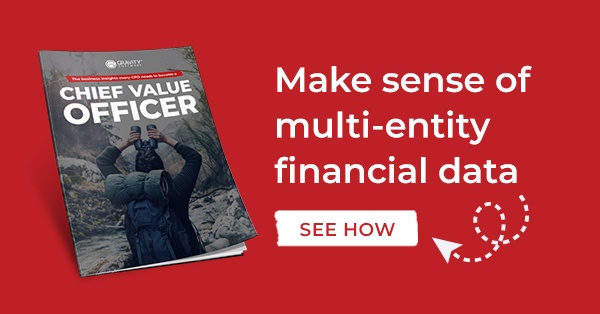Why ERP systems are wrong for SMBs

Business leaders are always looking for ways to maximize the value of investments and do more with less. So, when small to medium-sized businesses (SMBs) outgrow QuickBooks or another entry-level accounting solution, some leaders look to add an enterprise resource planning (ERP) system as a replacement. The thinking is that these expansive systems with wide-ranging capabilities are the best bet for enhancing operations now and into the future. Perhaps that’s why 50% of all companies are looking to add an ERP system soon.
But it turns out, that’s a mistake. The problems with ERP systems outweigh the advantages and business leaders should seek an alternative to ERP-level solutions that fit better with SMB needs and budgets. To help you make an informed decision about your next software purchase, here’s a look at why ERP systems are wrong for SMBs.
What are ERP systems?
Enterprise resource planning systems are large software solutions that are used to address a range of business needs. They can help businesses “implement resource planning by integrating all of the processes needed to run their companies with a single system. An ERP software system can also integrate planning, purchasing inventory, sales, marketing, finance, human resources and more,” according to the Investopedia definition. ERP systems are increasingly cloud-based but may also be deployed on-premises. ERP software is used by companies of all sizes, and manufacturing companies are the top users across industries.
The advantages of ERP systems
There are good reasons why a company might consider using an ERP system. Here are just a few of them:
Capabilities
ERP solutions are expansive systems that include functionality to help improve multiple areas of your business. As mentioned above, they can be used for everything from accounting to human resources and inventory management. This can make the systems an attractive option because they can be used by a wide range of business segments.
Simplicity
Using a single system instead of multiple pieces of software can create efficiencies by keeping all data under one roof, so to speak. This single source of truth for company data can be shared across departments and reduces the likelihood of errors. But it’s also critical the system is set up correctly in order to enjoy these benefits.
Future-proof
Many business leaders believe that even though they might not need everything an ERP system can do right now, they may develop a use case for those capabilities down the road. So, investing in an ERP system feels like a good way to future-proof the business and prepare for whatever comes next.
Innovative tools
Some ERP systems come with cutting-edge AI and business intelligence (BI) tools that business owners, CFOs and other stakeholders can use to develop stronger insights into company performance. This can lead to new initiatives and process redesigns that promote efficiency and productivity.
The disadvantages of ERP systems
While the above benefits may make ERP systems seem like a good choice, they have a lot of drawbacks that make them a poor fit for SMBs. Here are some of the disadvantages of ERP systems:
Cost
ERP systems are expensive. Like, really expensive. According to one study, “you can expect to spend about $9,000 on each user of your system.” While the monthly cost varies between software providers, the cost is generally much higher than a mid-market solution.
Complexity
Implementing an ERP system often takes a long time because of the complexity of the software itself. There are myriad system settings that need to be properly set up at the outset, taking additional time and resources to get right. That’s likely why 50% of ERP implementations fail the first time, the process takes 30% longer than expected and the cost is generally three to four times what was budgeted.
Performance
ERP systems do a lot, but they may not do it all very well. Many systems lack a user-friendly design and sufficient customer support, making the systems a burden on the everyday user.
Service and support
ERP systems are often developed by large software companies that lack the personalized support needed to make the most of your investment. If you have a question about inventory management, for example, a general support professional who answers your call may not have the technical knowledge or background to actually solve your problem. This makes it very difficult for SMBs that don’t have a large IT team in-house or rely on software providers as partners in supporting their solution.
What it all means for SMBs
Taken altogether, it’s clear that ERP systems are not well-suited for growing SMBs. While every situation is different, SMBs typically can’t bear the cost of ERP system subscriptions and don’t need all the unnecessary functionality. The truth is that SMBs don’t really need an ERP system in the first place. They need an innovative solution that allows the company to grow without breaking the bank. The good news there is that quality alternatives to ERP systems do exist.
A solution like Gravity Software® (Gravity) has capabilities like multi-entity financials, bank book management, inventory management and more, but without the expensive enterprise price tag. Gravity also has Microsoft Power BI and other advanced functionality, so companies don’t have to sacrifice innovation to stay in their budget. The system is also much more user-friendly than most ERP systems, empowering front-line employees who use the software most often to do their best work.
So, instead of simply opting for an expensive ERP system that doesn’t quite fit an SMB budget or business needs, business leaders should do their due diligence and find a mid-market solution best suited to take their company to the next level.
Want to enhance your operations without adding the cost and complexity of an ERP system? Contact Gravity Software to schedule a demo to see why our innovative accounting solution is the perfect fit for middle-market companies.
Gravity Software
Better. Smarter. Accounting.



